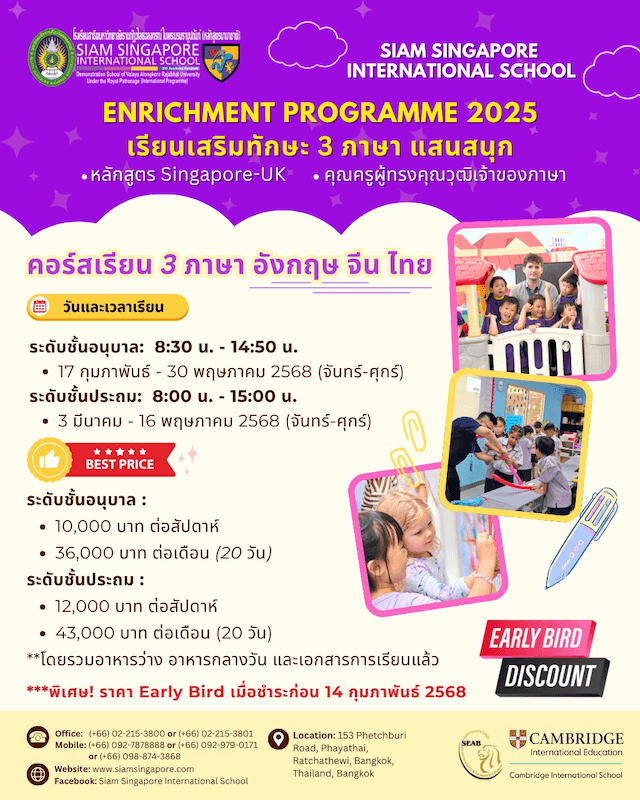Earlier this year, we asked parents to submit family health related questions to us, as part of an ongoing feature. We sent the most frequently asked questions to the Medical Coordination Office at Bumrungrad International Hospital to answer. Below are their responses.
1. What are the recommended vaccinations for foreign babies born in Thailand?
Most countries in the developed world tend to recommend the same kind of vaccines for babies and children. However, the immunization schedules may vary from country to country. For example, in the US and Canada, the flu vaccine is recommended for everyone over 6 months old, but in the UK, it is recommended to children, adults over 65, and special groups of people with serious medical conditions. Varicella (chicken pox) vaccines are recommended routinely in the US and Australia, but not in the UK. These variations are the result of differences in the patterns and frequency of the disease in each country.
It is important to have your child immunized according to the standard immunisation schedule of the country your child is currently residing in order to provide your child with full protection of the diseases that are prevalent in that country. Foreign babies who are born in Thailand are usually recommended to receive the standard vaccination as determined in the recommended immunization schedule for children in Thailand (please refer to our Healthy Living in Bangkok guide for new residents).
If you have plans to return to your home country in the future, please check the immunization schedule of your home country and consult with a pediatrician to ensure adequate immunization before returning to your home country. Other than for safety reasons, some countries, such as Australia, require children to be fully immunized according to the standard of their country before being eligible for child care benefit and family tax benefit.
Bumrungrad’s Healthy Living in Bangkok brochure has published a vaccination schedule that you can access here.
You can refer to external links for immunization schedules of various countries. For the United States, click here. For Australia, click here. And for European countries, click here.
2. What are the recommended vaccinations for babies and toddlers travelling to live in Thailand and when should they have them?
The recommended vaccination schedule by the Centers for Disease Control and Prevention is the same worldwide with few additional vaccines specific for certain countries. Your pediatrician can provide specific recommendations for Thailand which might include vaccines for Japanese Encephalitis, Typhoid, Yellow Fever, and Rabies depending on your travel and long-term plans.
For the recommended immunization for 2017 based on the CDC, which Bumrungrad may follow, for travel to Thailand, click here.
3. How effective is the chicken pox vaccine?
The chicken pox vaccine is very effective and following two doses of the vaccine, can prevent 98% of chickenpox infections. However, some children can still get the disease but will usually experience milder symptoms with fewer skin blisters and low grade to no fever.
4. How can I spot dengue in my baby and toddler? What are the signs? And how and when should I react?
Dengue is an illness caused by a virus transmitted to people by certain mosquitoes. Some people develop a more severe illness known as dengue hemorrhagic fever (DHF), which can be fatal if not diagnosed and treated promptly. Babies under 12 months are more likely to develop a severe case of the disease. If you live in or are traveling to a place where the illness is common, you can protect your baby by avoiding mosquito bites.
Many kids with dengue fever don’t have symptoms; others have mild symptoms that appear anywhere from 4 days to 2 weeks after being bitten by an infected mosquito. Symptoms typically last for 2 to 7 days.
Common signs and symptoms of dengue fever include:
- high fever, possibly as high as 105°F (40°C)
- pain behind the eyes and in the joints, muscles and/or bones
- severe headache
- rash over most of the body
- mild bleeding from the nose or gums
- bruising easily
Symptoms are generally mild in younger children and those who are infected with the disease for the first time.
Children with DHF will have the regular symptoms of dengue fever for 2 to 7 days. After the fever eases, other symptoms get worse and can cause more severe bleeding; gastrointestinal problems like nausea, vomiting, or severe abdominal (belly) pain; and respiratory problems like difficulty breathing. Dehydration, heavy bleeding, and a rapid drop in blood pressure (shock) can follow if DHF goes untreated. These symptoms are life threatening and need immediate medical care.
There is no medicine for dengue but there are things you can do to alleviate the symptoms:
- Make sure your baby gets plenty of chances to rest.
- Try to get your baby to nurse or drink frequently to avoid dehydration. (Babies under 6 months should drink only breast milk or formula. If your baby is 3 months or older, your doctor may recommend a rehydration liquid as well. Babies 6 months or older can have sips of water, too.)
- Acetaminophen can be used to relieve fever and pain. (Don’t give NSAIDS like ibuprofen or aspirin.)
- If your baby gets worse or starts vomiting in the first 24 hours after the fever goes down, go to the hospital or emergency room immediately.
- Babies who develop the more severe dengue hemorrhagic fever (DHF) may be hospitalized and given fluid replacement therapy. When diagnosed early, DHF can be effectively treated this way.
5. For hand, foot and mouth disease, how long do we have to wait to know that it is no longer contagious and can take the baby out in public?
Symptoms of hand, foot and mouth disease usually clear up in seven to 10 days, with your child being most contagious during the first week of illness. However, even when your child is fully recovered and is up and about, he can still remain contagious and spread the virus for a few more weeks, or even months after recovery. The disease is spread through person-to-person contact in two different ways: respiratory route and feco-oral route.
Respiratory route: The virus is spread through the nose, mouth and lungs for about 1-3 weeks. Transmission is through coughing or direct inhalation.
Feco-oral route: Even after recovery, the stool can be a source of infection for weeks or months later. Transmission can happen when a child dirties their hands or fingers and then touches an object that may come into contact with another child. As children are often likely to put their hands or objects into their hands, infections through this route is quite possible.
Prevention can be achieved through careful hygiene practices: Covering mouths with disposable tissue when coughing; hand washing after contact with mucus and changing diapers; regular cleaning and sanitizing of toys and household surfaces that come in contact with your child’s saliva; not sharing food and drinks, eating utensils, towels or toothbrushes; and while contagious, separate your child from other siblings.
6. Is it necessary to clean inside a baby’s ears? When we visit the pediatrician, my toddler often has some large dry material taken out of his ears. I can’t take this out on my own and was wondering if there is an issue of concern here.
Generally there is no need to clean inside your baby’s ears. A wet washcloth can be used to clean your baby’s outer ear. If you continue to see some buildup of earwax inside the ear canal, ask your pediatrician to have a look. He can determine whether regular cleaning is necessary and prescribe a simple cleaning solution for at home.
7. How important is for children to take multivitamins? My child doesn’t drink much milk and can be quite a picky eater. Are there any signs of nutrient deficiencies we should be aware of?
According to the American Academy of Pediatrics Committee on Nutrition, healthy children who are growing normally and consume a varied diet don’t need routine supplementation with vitamins and minerals. The Committee states that if parents wish to give their children supplements, a standard pediatric multivitamin generally poses no risk.
Signs of nutritional deficiencies in children include:
- Depression/Anxiety: These may be caused by lack of essential amino acids to produce proper levels of neurotransmitters. Protein is the source of amino acids.
- Hyperactivity: Children with hyperactivity or restlessness tend to have poor bacterial flora and digestion which lead to malabsorption of the nutrients through the gastrointestinal track.
- Delayed speech: Speech problems can be related to a vitamin B12 deficiency. Vitamin B12 can be found in dairy products, eggs, pork, chicken, beef and organ meats.
- Dry skin and hair: Fat-soluble vitamins such as vitamins A, D, E and K2 deficiencies can cause dry skin and hair.
- Crowding of teeth: Scientific researchers have shown that crowding of teeth occurs due to nutritional deficiencies, not only in the children who eat modern, processed food but also those whose mothers did not have a diet full of fats, complete animal protein and properly prepared carbohydrates.
- Dental cavities: It is found that children who lack the minerals and fat-soluble vitamins are more likely to develop cavities.
- Getting sick often: Lower levels of immunity can be a sign of nutritional deficiencies.
- Getting tired easily: Iron deficiency can be related to lethargy. A sufficient amount of iron can be found in meat, grains, fruits and vegetables.
- Leg pain: Calcium deficiency can lead to anxiety, difficulty sleeping and growing leg pain. Drinking 600-800 ml of milk per day is recommended for small children, while teenagers should increase their intake to 1,000 ml per day.
- Obesity: No surprise, when the body does not receive enough nutrients, it needs more food. A balanced diet should comprise of animal protein fruits, vegetables and properly prepared grains, in order to gain enough fat, carbohydrate and protein as well as vitamins and minerals that is necessary for growing children.
If your child is not eating well and shows some of the signs above, contact your pediatrician.
8. How safe is street food for children? In the worst case scenario, what illnesses could they contract?
Nobody is immune from food poisoning, which is a possible scenario in every country in the world. Eating street food in tropical developing countries such as Thailand can add unnecessary risks to your child’s health when caution is not taken. Your child can get bacterial food poisoning, hepatitis, typhoid and parasite infections to name a few illness that can be contracted from street food. It would be best to avoid street food when it is time for child’s meals, but if it can’t be avoided, choose only food that is well cooked to order and not food that has been left standing for some time. Choose only bottled water and avoid crushed ice in your drinks.
9. What are the best treatments for constant coughs in children that have not developed into infections?
Before getting into the treatments, it is really important to find out the real cause of this constant cough. Normally we cough when our body tries to rid itself of an irritant, or if there is mucus, to expel a foreign object. Common causes include infection; viral or bacterial infections including whooping cough, asthma, acid reflux from stomach and allergies/sinusitis etc. A child may also cough out of habit after having been sick with a cough; after inhaling a foreign object like food or a small toy; or after exposure to irritants like pollution from cigarettes or fireplace smoke.
In younger children, it is really important to rule out whether or not the child swallowed a small toy or foreign object which may have led to choking. A cough may occur after an episode of choking, but sometimes the choking episode might not be noticed. If you think this scenario is possible, you have to take the child to the doctor immediately.
If your child has a cough that lasts longer than two or three weeks, schedule a visit with your doctor. Coughing that lasts more than two weeks is considered chronic. It may be caused by asthma, allergic rhinitis (hay fever), reflux or other causes. An allergist is often the best specialist to determine the cause.
Even if the child’s cough doesn’t last long but is associated with high fever, wheezing, yellow secretion, chest tightness or blue discoloration of lips and fingers tips, you also need to seek medical attention right away.
If the child is exposed to tobacco smoke and other pollutants (smoke and exhaust from wood burning, air pollution and exhaust from vehicles), it can be an irritant cough and your child will need to avoid exposure to these agents.
If you can make sure that your child’s cough is not from infection and other serious condition as mentioned above, it might be a mild viral respiratory infection, it usually doesn’t need any specific treatment. You may try home remedies such as letting your child gargle warm saline, lemon juice, lozenges or over-the-counter antihistamines and cough syrups for this kind of cough.
Editor’s Note: This article is sponsored content from Bumrungrad International Hospital. It is intended as general information that may be useful for parents. It is not to be used as a substitute for professional medical advice, diagnosis, or treatment. Always seek the advice of your physician with any questions about a medical condition.















